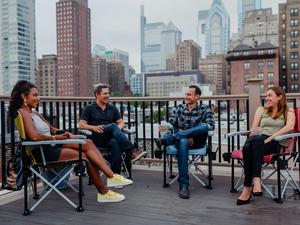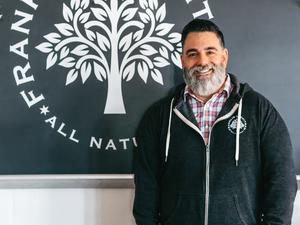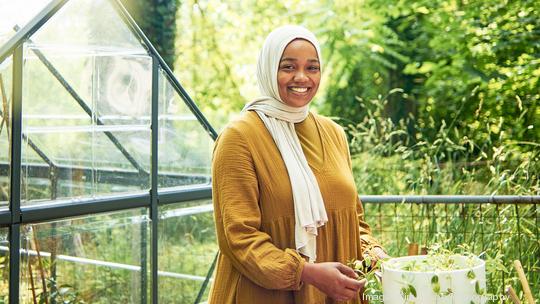
With a focus on Greater Philadelphia small businesses and entrepreneurs, "The Creators" is a weekly feature presented as a part of PHL Inno. Check back each Monday for a new profile on a local business. Have a story you think we should know about? Email associate editor Lisa Dukart at ldukart@bizjournals.com.
Shortly after giving birth to her son, Melanie Hasan began experiencing postpartum depression. To begin healing, she found herself turning to natural dyeing and textile design.
Trained in behavioral health – she earned both her undergraduate and graduate degrees at Saint Joseph’s University and worked in behavioral health nonprofits for eight years – Hasan struggled to connect her knowledge in the field with her personal experiences. “When you're going through postpartum, you feel alone. You have these burdens and you're overwhelmed with motherhood, as beautiful as it is,” she said.
Turning to textiles was a natural fit for Hasan, who had learned to sew from her mother. Textiles also fit into her increasing desire to make a career change.
Soon that change turned into an idea for a business, something that had been percolating.
At the end of 2018 when she was still pregnant, Hasan presented her annual vision board with goals and ideas for the year ahead, including a section she’d dubbed “modest transitions.” When her husband asked her about it, she told him she “wanted to refine my design skills, and just go into a career change.” Soon after, she enrolled in an adult fashion program at Moore College of Art and Design in Philadelphia, where she further honed her vision.
In the one-year program, Hasan not only refined her skills, but built the early stages of her business, aptly named Modest Transitions. “My final for my sustainability class became a brand, a business that I love so much, that I'm holding so close to my heart,” she said.
Officially founded in 2019, the apparel startup focuses on slow and intentional creation and incorporates sustainable practices. Not only are her designs inspired by nature, but many incorporate it directly. Hasan uses natural ingredients such as botanicals and plants to create the pigments for her dyes and even uses such items to create patterns on the textiles.
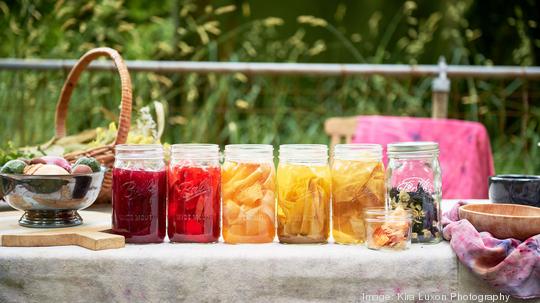
Favoring varying submersion baths, Hasan uses natural ingredients like flowers for dyeing. Depending on what’s left over, she repurposes it for a new color palette, uses it as ink for watercolors or simply waters her plants with it. When she first started dyeing, Hasan used items found in her kitchen, like spinach, onions, pomegranates and mint, noting it was a lot of trial and error.
Dyeing using botanicals or other natural ingredients isn’t a new concept, but it’s one that fell out of favor with the rise of industrialization. “We used to dye our clothes with turmeric and saffron and indigo. This isn't anything new,” she said. “I think as we are moving into being a more environmentally conscious society, we're revisiting things that were here already.”
Hasan has even started growing materials in her backyard greenhouse like indigo, madder root, and cotton to further her process.
Once fabrics are dyed, she creates apparel like tops, dresses, kimonos, jackets, and accessories like wallets, handbags, hats, and earrings. Hasan’s first product was scarves, which she calls crowns. “At the time, I was trying to bring awareness to natural beauty for women that had to cover,” she said, whether that was for the sake of modesty, religion, preference or because someone was going through cancer treatment and was losing her hair. As a Muslim woman herself, she also hopes the garment challenges the “many stereotypes and stigmas surrounding Muslim women and hijab,” she said. “I wanted to show women a creative way of how you could feel beautiful and inspired by wearing your crown.”
Her scarves, which range from $46 to $146 based on size, are a top seller, though trendy pieces like the baguette bags are also popular.
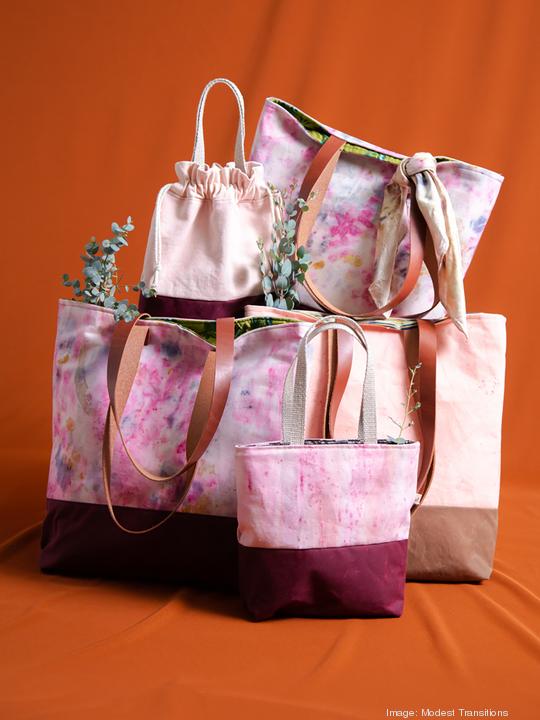
Also gaining popularity are her natural dyeing workshops, which she began offering this fall. “Because the workshop is so slow, thoughtful and is done with intention, it's not a moment where it feels like it's overwhelming and instructional,” she said, noting it often feels meditative.
That’s something she plans to expand upon when she debuts a brick-and-mortar outpost of Modest Transitions next year. Having recently signed a lease on a space, her goal is to open her storefront on Girard Avenue in the Fishtown neighborhood of Philadelphia in January.
As part of her expansion plans, Hasan is eyeing further spaces around the city for greenhouses, with a goal of providing materials and food for the community. An offshoot of the brand, she is currently crowdfunding for the community greenhouses on GoFundMe, with an aim of raising $25,000.
As she prepares to debut the brick-and-mortar, Hasan is coming off a year of growth of roughly 50%, though that isn’t exclusively revenue, she said. “A lot of it came from internal growth, being an entrepreneur and being willing to learn. So when I say 50%, that is not always equal to the financial portion of it, but I did things to enhance my business in such a way that I feel comfortable to be relevant within this industry.”
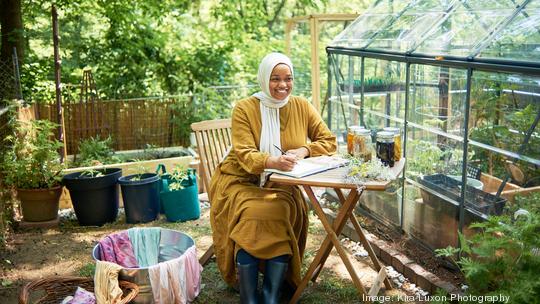
Part of that included being selected for the NextFab Artisan Accelerator this past spring. The eight-week program at the North Philadelphia location of the makers hub, which also has locations in South Philadelphia and Wilmington, is geared toward entrepreneurs looking to “craft profitable business models, reach new customers, and build sustainable companies,” according to its website.
Those lessons helped her scale and prepare for the next phase of Modest Transitions. Hasan is currently the only employee, though her husband helps with the dyeing process. “I am looking as we're scaling to hire women sewists,” she said.
Her designs are primarily sold direct-to-consumer through her website, but will expand to the store when it opens.
With each garment, Hasan’s goal is the same: to make something unique, which will in turn make the consumer feel the same way.
“I really love that my brand is [focused] around women that are looking for moments of healing and empowerment and inspiration and to know that you are beautiful,” she said.
What’s your brick-and-mortar going to look like?
I will be offering our workshops and you will be able to purchase our apparel. I have big plans for it, where I'm going to put some garden beds in the back.
Tell us about your vision for a community garden.
I'm trying to find a home to put our community greenhouse where we will have garden beds full of dye materials. I would like to have food that is accessible to our community. I am right now crowdfunding so we can make that happen so we can have lots of community involvement, lots of thoughtful conversations and so we can learn how to be a little bit more of a sustainable society. … My intention is to put kind of pop up community gardens around the city that are luscious gardens with dye material and textile work. I'm also looking to get into some nonprofit work that involves mental and behavioral health, using art therapy.
How did you get involved with NextFab and its accelerator program?
NextFab for me has been a really great opportunity as far as my mission values as a brand. It's a community space or a maker space. ... I was part of the artisan accelerator program, which is an eight-week cohort, where they help you with all of the fundamentals of how to start your business. They talk about business planning, financials, how to make a spreadsheet. And while you're going through, you get to meet industry people. ... How do you find manufacturing, if that's your preference, how to find patents, intellectual property, all those fundamentals that you don't know, as an entrepreneur, as a local artisan.
